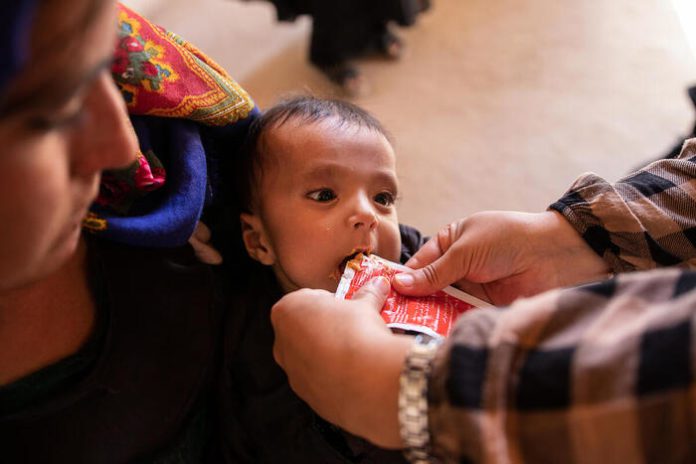Afghanistan’s severe hunger crisis, worsened by natural disasters and poverty, demands urgent international support to avert a catastrophic fallout.
As winter tightens its grip on Afghanistan, millions of vulnerable Afghans are facing a dire humanitarian crisis exacerbated by natural disasters, displacement, and a precarious economic situation. The unfolding tragedy has pushed the country to the brink, with around 23.7 million people in need of assistance, while humanitarian partners have prioritized 17.3 million individuals for support in 2024.
According to the World Bank, nearly half (48%) of Afghanistan’s population is experiencing poverty. Despite an improvement in Afghan households’ welfare since the political transition in August 2021, the overall situation is still marked by significant deprivation and extreme vulnerability.
The scale of acute food insecurity is staggering, as approximately 15.8 million people are projected to experience high levels of hunger between November 2023 and March 2024. Against this backdrop, the World Food Programme (WFP) has become a lifeline for many, providing essential aid to those grappling with the harsh realities of winter.
Khurma, a 45-year-old widow and mother of six, embodies the struggles faced by countless Afghans. Borrowing her neighbour’s shoes, she walks to Pul-e Alam city to collect a cash handout of 3,200 Afghanis ($45) from the WFP. “We are desperate,” she says, highlighting the profound scarcity of even basic necessities like bread.
Natural disasters have compounded the crisis, with thousands still sleeping in tents in Herat province after earthquakes in October rendered 31,000 homes uninhabitable. Additionally, the return of around half a million Afghans fleeing deportation from Pakistan has strained the country’s resources further, especially given the high levels of unemployment.
Rabbani, a 32-year-old refugee entitled to WFP aid, describes the grim reality: “There is no work here.” The harsh winter conditions have forced his family of seven to abandon their tent for a shack, making the struggle for survival even more challenging. As temperatures drop, the choice between hunger and death becomes a haunting reality for many.
Shakar Gul, a 67-year-old recipient of WFP aid, acknowledges the importance of providing for children, even if it means sacrificing her own well-being. However, the assistance provided is often insufficient to sustain families for an extended period, creating a cycle of dependency on aid.
The funding shortage for humanitarian aid in Afghanistan is a critical factor in this crisis. The WFP, which traditionally played a crucial role, has had to tighten criteria for aid handouts, leaving a gap of 10 million people without emergency assistance. Once a recipient of significant aid, Afghanistan’s funding has plummeted since the Taliban returned to power in mid-2021, contributing to the worsening conditions.
Extreme poverty is pervasive, with approximately 85% of Afghans living on less than $1 a day, according to the UN. The poorest face agonizing choices, from falling into debt to pulling children out of school or resorting to early marriages to ease household expenses.
In this challenging environment, humanitarian access constraints persist, hindering aid delivery. The spike in incidents reported by humanitarian partners in 2023 compared to the previous year underscores the difficulties faced by those trying to assist the vulnerable population.
As Afghanistan grapples with its hunger crisis, the international community faces a moral imperative to step up efforts and provide the necessary support. The Afghan people’s resilience is being tested amidst a perfect storm of challenges, and urgent action is required to prevent a catastrophic humanitarian fallout in the heart of Central Asia.
References:
https://www.arabnews.pk/node/2443001/world ; https://disasterphilanthropy.org/disasters/afghanistan-humanitarian-crisis/




